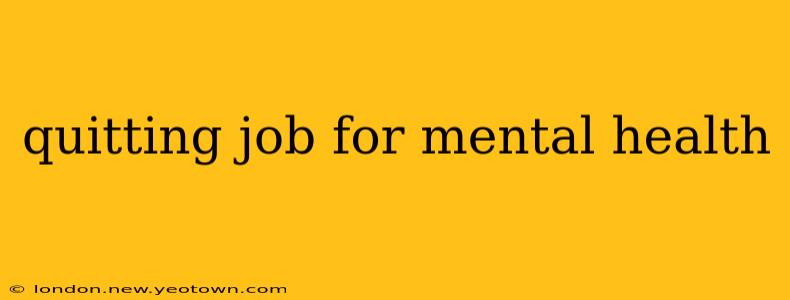The hum of the fluorescent lights, the relentless emails, the ever-present pressure – for many, the workplace can feel like a pressure cooker. But what happens when the pressure becomes unbearable, chipping away at your mental well-being? For some, the brave, and often difficult, decision is to quit their job. This isn't a decision to be taken lightly, but it's one that's increasingly understood and even championed. This journey, from recognizing the need to finding peace, is one of self-discovery and resilience.
My own journey started subtly. A gnawing feeling of anxiety, a persistent exhaustion that went beyond the typical workday fatigue, and a growing sense of dread each morning. Ignoring it felt impossible, and seeking help, both professional and personal, led me to the tough decision to leave my job. It wasn’t a rash act, but a carefully considered choice, prioritizing my mental health above all else. This isn't a tale of quitting impulsively; it’s a story about recognizing warning signs and making a strategic, life-affirming move.
Is It Time to Quit My Job for My Mental Health?
This is the million-dollar question, isn't it? There's no single answer, but several telltale signs can indicate it might be time for a change. Are you experiencing persistent anxiety, depression, or burnout? Do you dread going to work, consistently feeling overwhelmed and stressed? Are you experiencing physical symptoms like headaches, stomach problems, or sleep disturbances linked to work stress? These aren't just symptoms; they're cries for help from your body and mind.
It's crucial to listen to those signals. Ignoring them can lead to more significant mental health challenges. Don't underestimate the power of your intuition. If you're feeling consistently unhappy and drained, it's worth exploring if your job is a contributing factor.
How Do I Know if My Mental Health is Suffering Because of Work?
This question often overlaps with the previous one, but deserves its own spotlight. It's not always a straightforward connection. Is your anxiety tied directly to work deadlines, challenging colleagues, or an unsupportive work environment? Or are these work stressors exacerbating pre-existing conditions? Keeping a journal can be incredibly helpful. Note down your daily feelings, stress levels, and any specific events at work that might be contributing to your mental health struggles. This documentation will prove invaluable when assessing the situation and potentially discussing it with your doctor or therapist. Consider also the impact on your personal life – are your relationships, hobbies, and self-care practices suffering?
What Happens if I Quit My Job Due to Mental Health Issues?
Quitting your job due to mental health concerns is a significant decision with potential implications. Financially, it's crucial to plan ahead. Have you built up an emergency fund? Do you have savings or alternative income sources to help tide you over during your job search? Exploring options like unemployment benefits (depending on your location and circumstances) is important. Additionally, be honest (where comfortable) with potential future employers about your reasons for leaving your previous job. Many companies are becoming increasingly understanding and supportive of mental health.
How Can I Prepare to Quit My Job for Mental Health Reasons?
Preparation is key. This isn't about running away; it's about strategizing for a smoother transition. Start by creating a financial plan, as mentioned above. Then, begin updating your resume and LinkedIn profile. Network with colleagues and professionals in your field. Consider reaching out to a career counselor or therapist who can support you during this transition. Finally, ensure you have a strong support network—friends, family, or support groups—to help you through this process.
What Should I Say to My Employer When I Quit for Mental Health Reasons?
This is a highly personal decision. You're not obligated to disclose the specific reasons for your resignation. You can choose to offer a general statement, such as, "I've decided to pursue other opportunities," or "I'm stepping down to focus on my personal well-being." Alternatively, if you feel comfortable and safe doing so, you can explain that you're resigning to prioritize your mental health. This can contribute to a more understanding and supportive environment in the workplace. Remember, it’s your prerogative to protect your privacy.
The path to prioritizing mental health is a courageous one. Quitting your job can be a crucial step in that journey, a testament to your self-awareness and commitment to well-being. Remember, your mental health is your most valuable asset. Prioritizing it is not selfish; it's essential.

